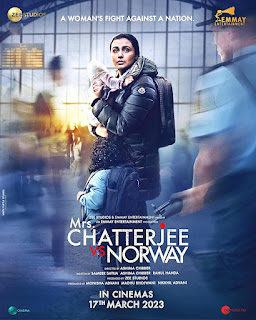A film that has its heart in the right place - or so it appears at first flush - should inarguably be worthy of generous applause. Mrs Chatterjee Vs Norway, directed by Ashima Chibber, isn't. Almost everything else in the overwrought and exhausting film, including the central performance by Rani Mukerji, is all haywire.
The mushy melodrama hinges on a mother's agony at being separated from her children in an alien country. The film does everything that it can to paint an entire foster care system as malicious and compromised. The brazenly broad strokes do little justice to the story of a distraught woman pushed to the wall and left with no option but to fight to be reunited with her children.
Mrs Chatterjee Vs Norway is based on a true story. One can fully comprehend what the aggrieved mother would have gone through as she took on a heartless system bent upon pummelling her into submission. Sadly, the film never rings true because it is way too strident and unsubtle.
Debika Chatterjee (Rani Mukerji) suffers the consequences of doing with her children - a two-year-old boy and five-month-old girl - what most Indian mothers tend to routinely do by way of parenting. She is unable to understand why feeding a child with her hand would be construed as force-feeding and used as a pretext to accuse her of being unfit to be a mother.
The film is primarily about a clash of cultures - the sort that immigrants often encounter in their adopted countries - and its unfortunate fallout. The heavy-handed treatment of the character's ordeal and her response to it turns her despair into a spectacle. What could have been a genuine cry from the heart turns into a shrill shriek in the process.
Two women from Norway's Child Welfare Services who take Debika's children away are projected as unscrupulous operators who give the Indian lady no chance at all to get her point across before they swing into action. Debika begs and bawls but to not avail.
Rani Mukerji, a performer of proven ability, is let down by the writing. She struggles to hit the right notes. She shifts back and forth between the rattled and the raucous. As a result, the essence of the character never quite comes through.
When the 135-minute drama, about an hour and half in, settles into a somewhat more controlled rhythm, Mukerji gets into her stride. But in the light of the mauling that the story of Debika's perseverance in the face of daunting odds has been subjected to in the first half, there is little left for the film to salvage in the run-up to the climax.
The screenplay by Sameer Satija, Ashima Chibber and Rahul Handa has been adapted from a Kolkata woman's published account of her brush with Norway's uncompromising child protection system. It is too erratic to be able to make the most of the deeply emotional core of the story.



0 Comments